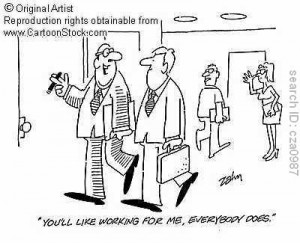Many people believe that in order to succeed in the business world, one needs to be cocky, brutal, arrogant, and snobby, as mentioned in Akaash’s blog post titled, “Being a Civilized Human Being and Succeeding in Business?” However, Abby Cohen is an example of someone that does not need portray these negative characters in order to be successful. Why do people believe that in order for one to succeed in business, one needs to be feared by others?  The best form of a leader is someone who anyone can approach comfortably, but has charisma that induces gentle fear into them. In other words, it’s (clarify) someone who is kind and caring but strict when things need to be taken care of. Furthermore, according to the book named “Bringing Out The Best In People”, by Aubrey C.Daniels, it’s how the boss motivates their worker that differentiates a successful business from a non successful business. The book mentions that bosses need to award employees that do a good job rather than punish the ones that do a poor job – something that many companies fail to do. Lastly, the boss has to motivate the workers by giving them long-term goals that have successive rewards throughout the process.
The best form of a leader is someone who anyone can approach comfortably, but has charisma that induces gentle fear into them. In other words, it’s (clarify) someone who is kind and caring but strict when things need to be taken care of. Furthermore, according to the book named “Bringing Out The Best In People”, by Aubrey C.Daniels, it’s how the boss motivates their worker that differentiates a successful business from a non successful business. The book mentions that bosses need to award employees that do a good job rather than punish the ones that do a poor job – something that many companies fail to do. Lastly, the boss has to motivate the workers by giving them long-term goals that have successive rewards throughout the process.
Source: Akaash’s blog








